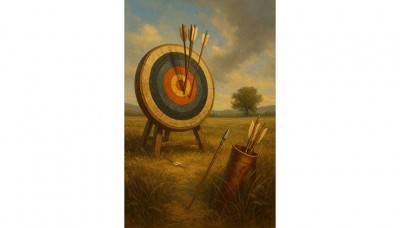
The Ben Ish Chai, in his Ben Yehoyada (Gittin 56b), tells a parable about the king of Spain who heard of a man reputed to be the world’s greatest archer. This man was said to possess unmatched mastery—his arrows never missed, and his aim was flawless.
The king, who was himself a talented archer, invited the man to his palace and publicly challenged him to a friendly competition, held before the royal court.
On the day of the contest, a special site was prepared. The rules were clear: Each man was to shoot arrows at a target marked with a central red circle—the bullseye. The winner would be determined by accuracy and consistency.
As was customary, the king shot first. Arrow after arrow, he displayed expert control—all landed within the bullseye, although each hit a slightly different spot. The crowd applauded his evident skill.
Then came the challenger. He too fired multiple arrows, yet not a single one hit inside the red circle. The judges and spectators quickly concluded that the king had won—his arrows were clearly within the target zone, while the archer’s were not.
But one of the king’s attendants quietly noted something remarkable: Although the man’s arrows missed the circle, every one had struck the exact same point—each one piercing the very hole made by the first.
After the ceremony, when they were alone, the archer turned to the king and said with sincere humility,
“I rejoice in your victory, my lord. But allow me to share something discreetly. Did you notice that while your arrows all landed inside the circle, they made many holes? Mine, though outside the mark, entered the same hole every time.”
Puzzled, the king asked what he meant.
The man replied, “I could have easily placed my arrows in the bullseye and into a single hole, but I purposely aimed just outside the mark out of honor for Your Majesty. I wanted you to be recognized as the winner. Yet, to hint at my true ability, I chose to demonstrate control by striking the same exact spot repeatedly—even outside the target.”
The king was stunned. He had witnessed greatness, not only in marksmanship but in wisdom—a man who understood when not to win. The king, deeply impressed, brought him into his treasury and rewarded him richly.
A Master Lesson in Humility
The Ben Ish Chai teaches this story to illustrate a refined but powerful character trait: the wisdom to let someone else feel that they’ve won.
This trait is especially essential when offering rebuke or mussar. If one corrects a friend harshly or openly proves them wrong, it often damages more than it helps. But if a person speaks with gentleness, timing, and respect, the words land far more deeply. By allowing the other person to retain dignity and agency, their heart remains open to growth.
How much more so is this true in marriage. A husband should never make his wife feel “defeated,” even if he believes he is right. Instead, he should express his view in a way that elevates and protects her dignity. Like the archer, he may find a way to make his point—but without injuring the spirit. There’s profound strength in restraint.
Sometimes, the most effective communication is not what is said in the moment—but what is subtly conveyed, and only understood later. That delayed recognition, precisely because it comes without humiliation, allows the message to be absorbed with love and grace.
Rabbi Leeor Dahan, a graduate of Yeshiva Chofetz Chaim/RSA, is a noted scholar and teacher, well-versed in halachah. He currently leads Kehilat Avodat Hashem in Hillcrest, Queens, inspiring his congregation to delve into Torah study and embrace its eternal teachings.
Winning Without Wounding
Typography
- Smaller Small Medium Big Bigger
- Default Helvetica Segoe Georgia Times
- Reading Mode




